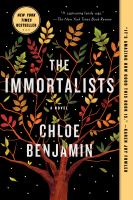The Immortalists by Chloe Benjamin
It’s halfway through a humid summer in 1969 on New York City’s Lower East Side, and the four Gold siblings are restless. There is no air-conditioning in the house, and life seems to be happening to everyone else but them. Kids are getting wasted at Woodstock, there is rioting outside the Stonewall Inn, people are even walking on the moon.
Daniel has heard that a rishika, a fortune-teller, recently moved into the neighborhood. Rumor has it that rather than foretelling what will happen in your life, her particular skill is naming the exact date of your death. The siblings find her apartment and she takes them in one at a time, making each promise never to speak a word to anyone about the date she shared.
Thus begins Chloe Benjamin’s family saga, The Immortalists, which follows Simon, Klara, Daniel, and Varya through five decades observing how the date shared by the rishika shapes their lives. Some of the dates are far in the future, some tragically close. It is what the siblings do with this knowledge that makes this such a compelling story.
If you knew the date of your death, how would you live your life? Benjamin ably takes on the question of fate or free will, showing that such knowledge can be a double-edged sword. Do the siblings make decisions because of the prophecy? Are the shortest lives the ones lived most fully? Benjamin dedicates a section of the book to each, delving into each personality to explore how these questions of destiny play out.
Simon, the youngest, follows his sister Klara to San Francisco where, at 16, he commits himself to living an authentic existence as a young gay man. It is the early ’80s in the Castro District; people still mourn Harvey Milk’s assassination and the AIDS crisis is devastating the community. Simon gets a job dancing at a club, which eventually leads him to the Ballet Academy, where he becomes a featured performer and finds love with a fellow dancer.
Meanwhile, Klara hones her magic show and tries to make her way in a white, male-dominated profession where women are usually mere props. Idealistic Klara wants her magic to remind people of the mystery inherent in the world; practical Klara uses sleight-of-hand skills to pad her wallet through pickpocketing when money gets thin between shows. Her success eventually leads her to Las Vegas, where she is booked as the opening act for Siegfried & Roy.
The older siblings, Daniel and Varya, are more staid than Klara and Simon. Daniel becomes an Army doctor during the Iraq and Afghanistan wars and stays closer to home and the Judaism of his youth. Varya, the eldest, is anxious, fixated on control, and takes an evidence-based approach to truth that leads her to scientific study. Ironically, determined to outsmart death, her life’s research is a longevity study with primates.
How many of these life choices were made because of the date lodged in their consciousness by the fortune-teller? Benjamin’s novel certainly reminds the reader of the power of thoughts to shape reality, and begs the question, so poignantly asked by poet Mary Oliver, “Tell me, what is it you plan to do with your one wild and precious life?”
Lisa Gresham is the Collection Support Manager for Whatcom County Library System.
(Originally published in Cascadia Weekly, March 21, 2018.)

